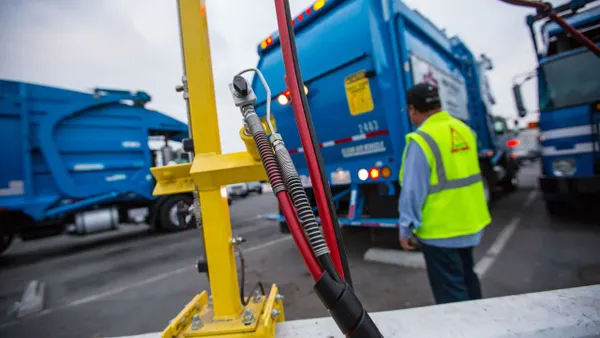Dive Brief:
- In honor of "Winning on Reducing Food Waste Month," the Trump administration recently announced a six-point strategy to advance the U.S. goal of 50% food waste reduction by 2030. Priorities include interagency coordination, consumer education, measurement, food safety and labeling, private industry collaboration and waste reduction at federal facilities.
- The EPA, USDA and FDA signed an agreement with national nonprofit ReFED to partner on these goals over at least the next two years. Priorities include collaboration with various levels of government, data collection and reporting on trends in the field, among other items.
- More than $110,000 in EPA grant funding was also announced for small-scale projects related to anaerobic digestion. Recipients include Vermont's Department of Environmental Conservation, Washington State University and Madison, Wisconsin — which is exploring a regional organics collection program.
Dive Insight:
Established by the Obama administration in 2015, the 2030 food waste reduction goal was once assumed to be a likely casualty of the Trump administration's environmental agenda. Amid the initial months of concern about possible EPA budget cuts and other shake-ups, it was often unclear even to some of the initiative's most active stakeholders where things stood. However, the participation of numerous federal officials at last summer's U.S. Food Waste Summit and the subsequent interagency rebranding in the fall indicate that the issue has been able to gain traction.
The release of this latest interagency plan is seen as historic in itself — and notable because it draws on many of the recommendations published by leading groups such as the Harvard Food Law and Policy Clinic — even if the framing might be different than some had originally envisioned. Rather than focusing on the climate implications of methane emissions from organic waste, the Trump team is more driven by economic opportunities.
"In one sense, this is a problem derived from America's incredible achievements in agriculture and technology," said EPA Administrator Andrew Wheeler at an April 9 event, going on to recount a story about former Russian President Boris Yeltsin's surprise when he saw the bounty of a Texas grocery store in 1989. "Together, we can promote American prosperity and turn wasted food into solutions that can feed America's communities, fuel our economy and maximize our resources."
USDA Secretary Sonny Perdue acknowledged the topic didn't seem like a natural fit for the Trump administration until it recognized the economic and moral potential. "We produce an abundance of food to feed the world and we want that abundance to feed and nourish people, not filling the trash and landfills across the country," said Perdue during the event.
Teaming up with ReFED, an increasingly dominant player in this area with close ties to interested philanthropic and corporate parties, suits the administration's market-driven approach. Combined with a variety of policy initiatives and infrastructure funding in the 2018 Farm Bill, this latest set of actions has the potential to bring a new wave of federal resources to bear on an often-overlooked national issue.
Unlike at the state or local level — where jurisdictions are taking more steps to mandate organic waste reduction, donation and recycling — the federal government isn't expected to exert any regulatory pressure in the near term. Instead, it's looking to voluntary commitments from 23 (and counting) corporate "champions" that have pledged to work toward the 2030 goal in their supply chains.
As recognized by the UN in a 2018 progress report on its own 2030 food waste goal, the pace will need to intensify soon — with much better measurement methods to track progress — if these targets will be anywhere close to attainable over the coming decade.










